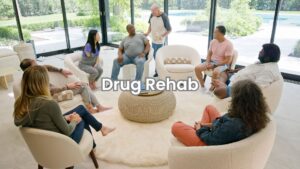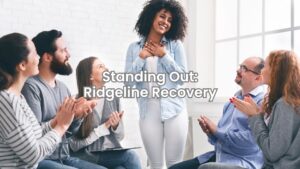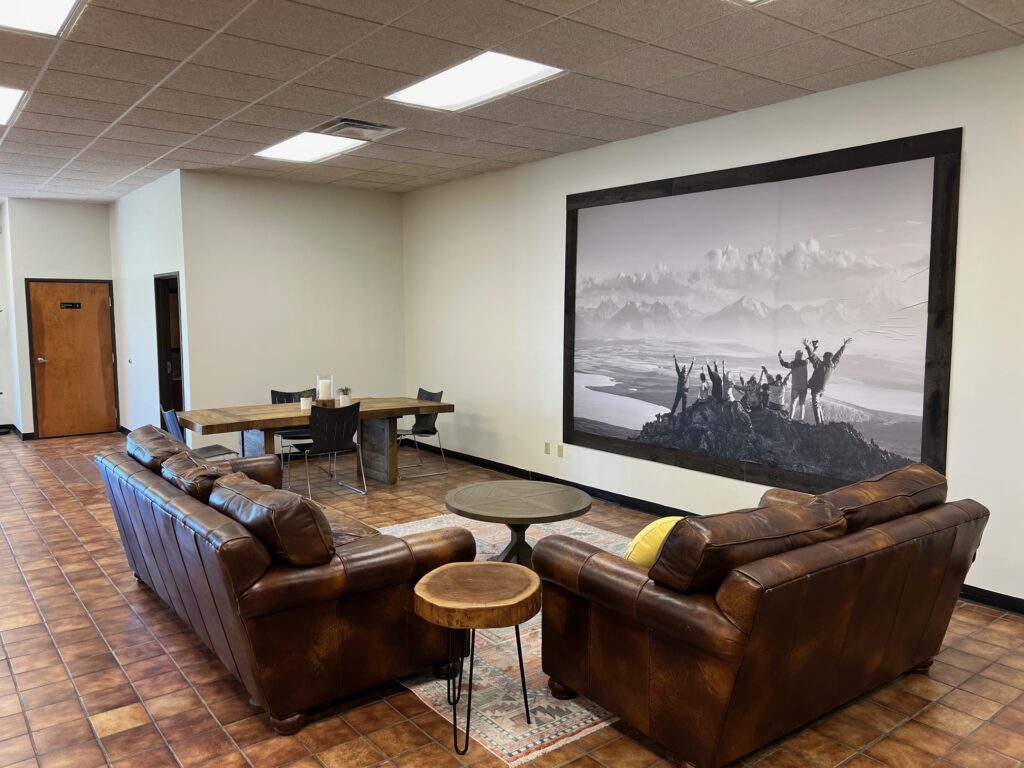Getting Help That Works: What to Know About Drug Rehab
When you’re stuck in the cycle of addiction, it can feel like there’s no way out. Maybe you’ve tried to quit before. Maybe you’ve promised yourself “just one more time” more times than you can count. But deep down, you know something has to change.
If you’re looking for real, lasting recovery, drug rehab isn’t just a place—it’s a turning point.
The right program doesn’t just get you sober. It helps you understand why you use, teaches you how to cope, and gives you the tools to rebuild a life you don’t want to escape from. There are options that go beyond quick fixes and programs focused on your long-term healing, not just checking boxes.
Let’s break down what drug rehab in actually looks like, what you should be looking for, and how Ridgeline Recovery in Columbus helps people step into lasting change with clarity, structure, and support.

What Does Drug Rehab Look Like?
Not all rehab programs are the same—and that’s a good thing. The goal isn’t to shove everyone through the same process, but to find what actually works for where you are in your recovery. There is a range of options that balance structure, flexibility, and support, from intensive care to community-based support.
Here’s a closer look at what drug rehab might include:
1. Detox (Medical Stabilization)
Detox is often the first step for many people entering recovery. It’s designed to help the body safely withdraw from substances like opioids, alcohol, or benzodiazepines. This process should always be medically supervised due to the risk of severe withdrawal symptoms.
2. Medication-Assisted Treatment (MAT)
MAT combines FDA-approved medications (like Suboxone, Methadone, or Vivitrol) with counseling and behavioral therapy. It’s especially effective for opioid and alcohol use disorders.
4. Inpatient or Residential Treatment
Inpatient rehab involves living at a treatment facility full-time. You’ll be surrounded by clinical staff, therapists, and peers working toward the same goal. This is ideal for individuals who need 24/7 support and a structured environment, especially early in recovery.
5. Partial Hospitalization Programs (PHP)
PHPs allow you to receive intensive care during the day, typically 5 to 6 hours, then return home or to a sober living environment at night. It’s a good fit for those who need strong support but also have some level of stability outside treatment.
6. Intensive Outpatient Programs (IOP)
IOP offers therapy and group sessions several times a week while allowing you to maintain other responsibilities like work, school, or family. It’s a flexible option that still provides structure and accountability.
7. Standard Outpatient Treatment
This level of care typically involves weekly sessions with a therapist or counselor. It’s well-suited for those transitioning out of higher levels of care or who are further along in their recovery journey.
8. Aftercare and Long-Term Support
One of the most important, yet often overlooked, parts of drug rehab is what happens afterward. Aftercare programs keep individuals connected to their recovery goals, community, and support systems. These may include alumni groups, sober living homes, peer support, and ongoing therapy.
As noted by the National Institute on Drug Abuse, “Addiction is a treatable, chronic disease that can be managed successfully. Treatment enables people to counteract addiction’s disruptive effects on their brain and behavior and regain control of their lives.” This highlights why continued engagement in treatment even after rehab is critical for lasting success.

How to Choose the Right Drug Rehab in Columbus
There are many different treatment centers and programs available, which means you have the opportunity to find one that truly fits your or your loved one’s unique needs. And finding the right place means asking honest questions and knowing what to look for.
Here’s a simple guide to help you narrow it down:
1. What Level of Care Do You Need?
Start with a realistic look at your situation. Have you tried outpatient treatment before without success? Are you coming out of detox and need structure? The more support you need, the more appropriate something like inpatient or PHP might be.
2. Is the Program Evidence-Based?
Not all treatment is created equal. Look for programs that offer therapies backed by research, like harm reduction, trauma-informed care, motivational interviewing, cognitive–behavioral therapy, contingency management, mindfulness, acceptance and commitment therapy, and psychoeducation. These approaches are proven to help people understand their triggers and change behavior over time as backed by research from SAMHSA.
3. Do They Offer Dual Diagnosis Support?
Many people dealing with substance use also struggle with mental health issues like anxiety, depression, or post-traumatic stress disorder (PTSD). A rehab center that offers dual diagnosis treatment (also called co-occurring disorder treatment) can address both issues at the same time which is essential for long-term recovery.
4. What Is the Staff Like?
Credentials matter. Look for licensed clinicians, medical professionals, and peer support staff with lived experience in recovery. A good treatment team isn’t just educated, they’re empathetic and truly invested in your growth.
5. Is There a Plan for Aftercare?
A solid drug rehab program doesn’t just help you get sober. It prepares you to stay sober. Ask about what support looks like after treatment ends. Do they help with finding Alcoholics Anonymous (AA) or Narcotics Anonymous (NA) meetings? Can they refer you to sober housing, career support, or alumni programs?
6. What Do Reviews and Testimonials Say?
You can learn a lot from others who’ve been through the program. Search online, check Google reviews, or ask the center directly for success stories. Word of mouth, especially within the Columbus recovery community, goes a long way.
7. Is It Convenient and Accessible?
Practical matters count too. Is the facility close to home or work? Do they accept your insurance or offer payment plans? Are there virtual options if needed?
At the end of the day, the best rehab is the one that you’ll stick with. It should feel like a place where you’re not just being treated but also understood.
How Ridgeline Recovery Stands Out in the Columbus Recovery Community
At Ridgeline Recovery, we understand that no two paths to sobriety are the same. What sets us apart isn’t just our clinical approach—it’s our commitment to real, lasting community-based healing.
Here’s what makes our drug rehab in Columbus different:
1. Customized Levels of Care
We offer a range of treatment options including:
- Medication-Assisted Treatment (MAT) for individuals who qualify to use FDA-approved medications (like Suboxone or Vivitrol) with counseling and therapy.
-
Partial Hospitalization Program (PHP) for individuals who need a structured environment during the day but return home or to sober housing at night.
-
Intensive Outpatient Program (IOP) for those balancing recovery with work, school, or family life.
-
Aftercare and Alumni Support that keeps you plugged in and growing even after formal treatment ends.
We help you figure out what level of support is appropriate and adjust as you progress.
2. Dual Diagnosis and Mental Health Support
Many of our clients come to us with both substance use and underlying mental health concerns. Our team specializes in dual diagnosis care, treating conditions like anxiety, depression, trauma, and more—because recovery isn’t just about quitting drugs or alcohol. It’s about healing the root causes too.
3. Community-Focused Recovery
Connection is what holds recovery together. That’s why we emphasize participation in local support groups, service work, and sober social activities. Whether it’s helping you find your AA homegroup or attending community events, we want you to feel a sense of belonging in the Columbus recovery scene.
4. Professional, Empathetic Team
Our staff includes licensed therapists, peer recovery coaches, case managers, and addiction specialists who genuinely care. Most have walked this path themselves. They’re here to support, challenge, and walk alongside you every step of the way.
5. Recovery That Goes Beyond the Facility
Treatment at Ridgeline doesn’t stop when you walk out the door. We help clients:
-
Connect to long-term housing
-
Rebuild careers and education
-
Strengthen family relationships
-
Stay involved in sober community spaces
Because long-term recovery is about building a life worth staying sober for.
You Don’t Have to Do This Alone
Choosing the right drug rehab in can be the difference between temporary sobriety and lifelong recovery. It’s not just about detox or therapy—it’s about finding a place that understands your struggles, supports your goals, and walks with you through every stage of healing.
At Ridgeline Recovery, we don’t just treat addiction—we help you rebuild your life. From specialized care plans to deep community involvement, our team is here to support you well beyond your first day clean.
Recovery isn’t a quick fix. It’s a journey. But with the right support system, structure, and connection, it’s absolutely possible. If you’re ready to take the first step or the next one, we’re here to walk beside you.
👉 Visit Ridgeline Recovery to learn more about our programs
📞 Contact Us to speak with a team member today
You deserve more than just a treatment plan. You deserve a fresh start. Let’s begin together.




